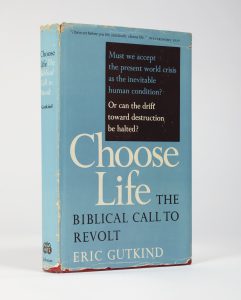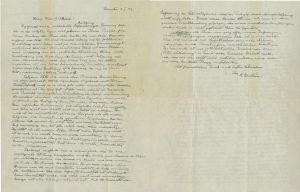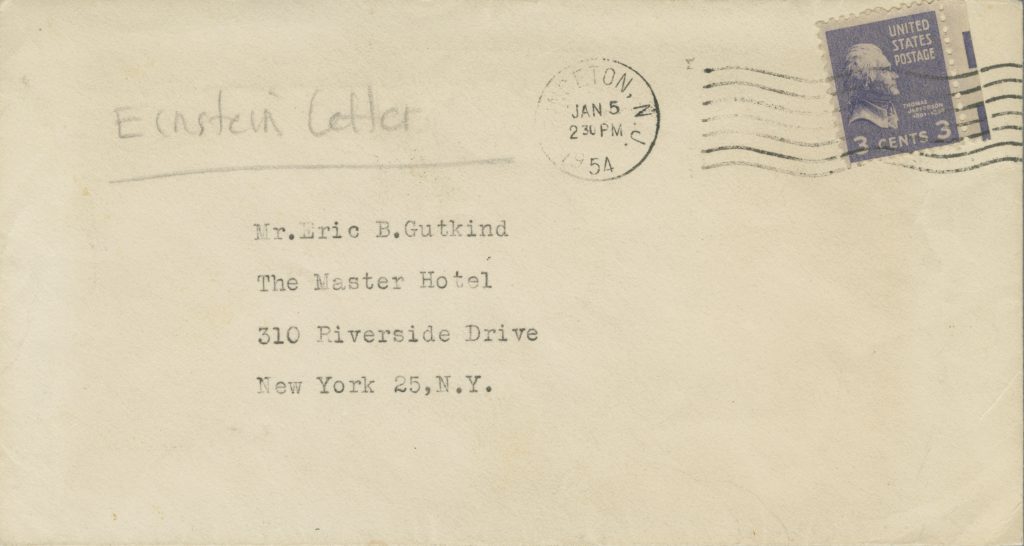A letter signed and sent by German-born theoretical physicist Albert Einstein to author and philosopher Eric Gutkind in 1954 realized $2.89 million USD (about $3.85 million Cdn.) at an auction in New York earlier this month.
Offered as the only lot of the Dec. 4 sale by Christie’s, the two-page letter – known to history as the “God Letter” – included its original cover; Gutkind’s 1952 book Choose Life: The Biblical Call to Revolt, which was the reason for the letter; and a black-and-white photograph of Gutkind.
In the letter, which is dated Jan. 3, 1954, Einstein denounces the religious beliefs espoused in Gutkind’s book as “childish superstitions” in what the auction house called the Nobel Prize winner’s “single most famous letter on God, his Jewish identity, and man’s eternal search for meaning.”
Estimated at between $1 million USD and $1.5 million USD, the lot nearly doubled its high estimate and set a world record for the sale of an Einstein letter.
One year before his death, Einstein, then aged 74 and living in Princeton, N.J., wrote: “The word God is for me nothing but the expression and product of human weaknesses, the Bible a collection of venerable but still rather primitive legends. No interpretation, no matter how subtle, can change anything about this.”

Gutkind’s book espoused strong and controversial religious beliefs, which Einstein called ‘childish superstitions’ in his 1954 letter. (Photo by Christie’s)
RELIGIOUS CALL TO ARMS
Gutkind’s third book, Choose Life presented the Bible as a call to arms and Judaism and Israel as incorruptible.
“Israel is not merely the late result of a long evolution,” wrote Gutkind. “It is an intrinsic part of reality, from the very beginning. Because it is a maximal possibility of evolution, it is the very principle of evolution.”
Born in Berlin, Gutkind eventually left Germany for the U.S. in the 1930s.
He died in 1965, more than a decade after Einstein sent him the “God Letter.”
FULL LETTER
Below is an English translation of Eintein’s full letter, which was written in German except for two words, “un-

The letter, its cover and a copy of Gutkind’s book along with a photograph of the author realized $2.89 USD at a Dec. 4 auction. (Photo by Christie’s)
American attitude.”
Princeton, 3. 1. 1954
Dear Mr Gutkind,
Inspired by Brouwer’s repeated suggestion, I have read a great deal in your book in the last few days: thank you very much for sending it to me. What struck me particularly was this. We are largely alike as regards our factual attitude to life and to the human community: an ideal that goes beyond self-interest, with the striving for release from ego-oriented desires, the striving for the improvement and refinement of existence, with an emphasis on the purely human element, by which inanimate things are to be perceived purely as a means, to which no dominant function is to be attributed. (It is especially this attitude that unites us as an authentically “un-American attitude”).
Nevertheless, without Brouwer’s encouragement I would never have brought myself to engage at all closely with your book because it is written in a language which is inaccessible to me. The word God is for me nothing but the expression and product of human weaknesses, the Bible a collection of venerable but still rather primitive legends. No interpretation, no matter how subtle, can (for me) change anything about this. These refined interpretations are naturally very diverse, and have virtually nothing to do with the original text. For me the unadulterated Jewish religion is, like all other religions, an incarnation of primitive superstition. And the Jewish people to whom I gladly belong, and in whose mentality I feel profoundly anchored, still for me does not have any different kind of dignity from all other peoples. As far as my experience goes, they are in fact no better than other human groups, even if they are protected from the worst excesses by a lack of power. Otherwise I cannot perceive anything “chosen” about them.
In general, it pains me that you claim a privileged position and try to defend it by two walls of pride, an external one as a human being and an internal one as a Jew. As a human being you claim to a certain extent a dispensation from the causality which you otherwise accept, as a Jew a privileged status for monotheism. But a limited causality is no longer a causality at all, as indeed our wonderful Spinoza originally recognized with absolute clarity. And the animistic conception of natural religions is in principle not cancelled out by monopolization. With such walls we can only attain a certain self-deception; but our moral efforts are not furthered by them. Quite the opposite.
Now that I have expressed our differences in intellectual convictions completely openly, it is still clear to me that we are very close to each other in the essentials, that is, in our evaluations of human behavior. What divides us is only intellectual padding or the “rationalization” in Freudian language. So I think that we would understand each other very well if we conversed about concrete things.
With friendly thanks and best wishes,
Yours,
A. Einstein
ACCRUING VALUE
The “God Letter” was first sold shortly after Einstein’s death and has been in private hands ever since.
The letter was last sold on eBay in 2012 for $3 million USD. Its previous owner paid $404,000 USD for it in 2008.



